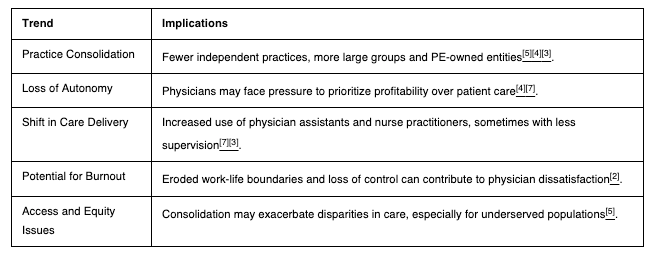Why Your Independent Dermatology Practice Might Not Survive the Next Five Years
The call came in on a Tuesday afternoon. Another dermatologist was closing shop—not because of patient complaints or poor outcomes, but because the practice couldn't keep up with the mounting pressures that have nothing to do with patient care.
Sound familiar? If you're running an independent dermatology practice, you're part of a shrinking group. The numbers don't lie: independent practices are disappearing at an alarming rate, and the forces driving this change aren't slowing down.
The Perfect Storm Hitting Your Practice
Let's be honest about what you're facing every day. It's not just one problem—it's everything hitting at once.
Administrative Burden That Never Ends You didn't go to medical school to become a paperwork expert, but that's what running a practice demands. HIPAA compliance, OSHA requirements, insurance authorizations, and billing complexities eat up to 40% of your time. That's two full days each week spent on tasks that don't help a single patient.
Money Problems That Keep Getting Worse Medicare reimbursements keep shrinking while your costs keep climbing. That new laser equipment? It costs more than ever. Your rent, utilities, and staff wages? All going up. Meanwhile, insurance companies find new ways to delay or reduce payments.
The math is simple: when expenses rise faster than revenue, something has to give.
The Private Equity Feeding Frenzy Here's what's really happening: private equity firms have discovered dermatology is a goldmine. Nearly 20% of all private equity healthcare acquisitions since 2014 have targeted dermatology practices. They're not buying practices to improve patient care—they're buying them because the numbers work.
These firms have deep pockets and can offer struggling practices what seems like a lifeline. But once they own your practice, priorities shift from patient outcomes to profit margins.
What This Means for Your Practice

The landscape is changing fast, and not necessarily in your favor:
You're Losing Control Over Care Decisions In consolidated practices, treatment decisions increasingly factor in profitability. That expensive but effective treatment? It might not make the approved list. The time you want to spend with complex cases? It doesn't fit the schedule optimization algorithm.
Your Staff Structure Is Under Pressure Large practices push for efficiency by using more physician assistants and nurse practitioners with less supervision. While these providers can be excellent, the model prioritizes volume over the personalized care that defines quality dermatology.
Your Autonomy Is Disappearing Employment in a large group means someone else sets your schedule, chooses your software, and decides your vacation days. The freedom to practice medicine your way—the reason many dermatologists chose this path—gets traded for stability and reduced administrative headaches.
The Hidden Costs of Consolidation
Beyond the obvious changes, consolidation creates problems that don't show up in the sales pitch:
Quality Takes a Hit When profit drives decisions, corners get cut. Overbooking becomes standard. Follow-up care gets rushed. The thorough, patient-centered approach that builds trust and delivers results gets replaced by high-volume, assembly-line medicine.
Your Patients Lose Out Consolidated practices often limit provider networks and increase co-pays. Patients lose continuity of care and face longer wait times. The personal relationships that make dermatology rewarding for both doctor and patient become casualties of efficiency.
Burnout Becomes the Norm Loss of autonomy and control over your practice leads to job dissatisfaction and burnout. Studies show that employed physicians report higher stress levels and lower job satisfaction than their independent counterparts.
Paths Forward That Actually Work
Despite these challenges, independent dermatology isn't doomed. Smart practices are finding ways to thrive by addressing the root problems:
Partner Smart, Not Just Big Instead of selling to private equity, consider partnerships with specialized management companies that handle administrative burdens while preserving your clinical autonomy.
These partnerships can provide the support you need without sacrificing the independence you value.
Use Technology as Your Competitive Advantage The right technology can level the playing field. AI-assisted diagnostics, streamlined patient communication systems, and automated administrative tasks can help small practices compete with larger operations without losing their personal touch.
Focus on What Makes You Different Large practices compete on volume and efficiency. Independent practices compete on quality, personalization, and expertise. Double down on what makes your practice special: the relationships you build, the time you take with complex cases, and the personalized care only a physician-owner can provide.
Get Your Business Foundation Right Many independent practices fail not because of clinical problems, but because of business problems. Proper financial management, strategic planning, and operational efficiency aren't optional—they're survival skills.
The Choice Is Yours
The dermatology landscape will continue changing, but independent practices that adapt strategically can not only survive but thrive. The key is recognizing that running a successful practice today requires more than clinical excellence—it requires business acumen, technological savvy, and strategic thinking.
The question isn't whether change is coming—it's whether you'll shape that change or let it shape you.
Your practice, your patients, and your professional satisfaction depend on the choices you make today. The practices that survive and thrive will be those that embrace change while staying true to what makes dermatology a calling, not just a business.
Don't let your practice become another statistic in the consolidation trend. With the right strategy, support, and commitment to excellence, independent dermatology can have a bright future.
Ready to future-proof your practice? The time to act is now, before the perfect storm becomes the perfect disaster.
- https://www.coronishealth.com/blog/dermatology-specialty-consolidation-trend-in-medical-practice-industry/
- https://practicaldermatology.com/topics/practice-management/challenges-and-opportunities-for-the-dermatology-specialty/23881/
- https://pubmed.ncbi.nlm.nih.gov/33939519/
- https://www.dermatologytimes.com/view/6-concerns-about-practice-consolidation
- https://pmc.ncbi.nlm.nih.gov/articles/PMC8361903/
- https://www.dermatologytimes.com/view/number-of-physician-owned-private-practices-saw-major-decline-since-2018
- https://www.nbcnews.com/health/health-care/get-money-dermatologist-says-patient-care-suffered-private-equity-back-rcna9152
- https://mdedge.com/cutis/article/87854/health-policy/challenges-facing-our-specialty
- https://www.dermcaremgt.com/2022/01/independent-dermatology-practice-vs-derm-group/
- https://www.dermcaremgt.com/2023/01/setting-long-term-growth-goals-your-practice/
- https://feinsteindermatology.com/blog/the-future-of-dermatology-what-to-expect-in-2024-and-beyond/
- https://www.linkedin.com/pulse/3-trends-driving-dermatology-entrepreneurship-arlen-meyers-md-mba-wteuc